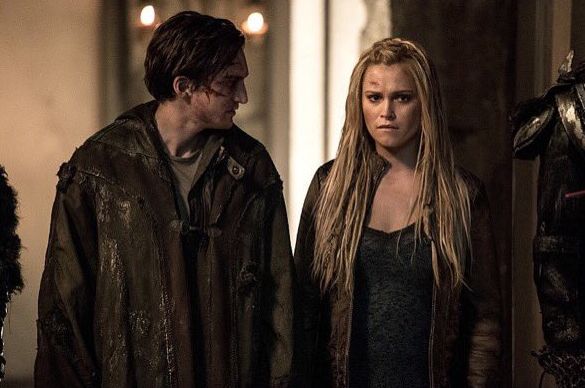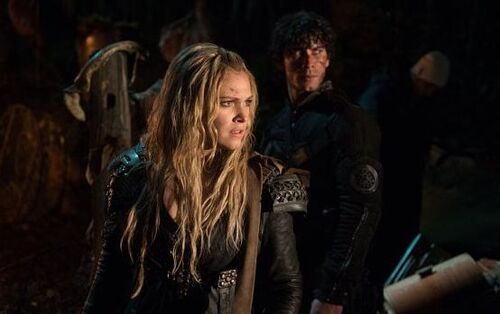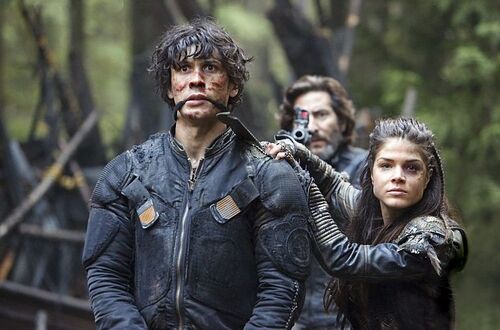
The 100 3x09 "Stealing Fire" Review
 After a three week hiatus The 100 returned amid scrutiny to begin the back half of its third season with one of its bleakest episodes yet. Stealing Fire saw the return of a Clarke who is an active participant in the narrative, but also brought the death of yet another beloved character.
After a three week hiatus The 100 returned amid scrutiny to begin the back half of its third season with one of its bleakest episodes yet. Stealing Fire saw the return of a Clarke who is an active participant in the narrative, but also brought the death of yet another beloved character.
This review contains spoilers for 309, read at your own peril. To briefly recap what happened in the episode:
Clarke and Murphy are still very much in Polis, except now must deal with the aftermath of the power vacuum left by Lexa’s death (and wannabe-commander Ontari’s intent to wipe out the Arkers). Ontari kills all the Night Blood children in Polis, ensuring she is the only viable candidate left for the job, and Clarke conspires to take the AI chip to an alternative candidate.
Back at Arkadia, Monty and Bellamy’s turn back to the light at the end of 308 is not well-received by Miller, Harper and Octavia. Their (admittedly, valid) mistrust renders the plan to rescue Kane, Lincoln, Sinclair and the grounder prisoners half-baked. Bellamy’s attempt to help gets him chained up in a cave for the entirety of the episode, and Monty is left very much out of the loop. The episode culminates in Lincoln being shot by Pike as a distraught Octavia looks on outside of Arkadia.
Stealing Fire sets the groundwork for the anticipated switch of focus from Polis to the City of Light storyline, which has slowly been gaining traction with the involvement of Raven back at Arkadia. As we are halfway through the season and are yet to see any meaningful intersection of these two plots or the involvement of more than one main character, some movement in that direction is very much welcome.
The major plot point in the Polis storyline was Ontari’s murder of the younglings (sorry, Night Bloods). Clarke voices one of my favourite lines of the episode, and something I have been pondering myself: “If night blood is so rare then why do you let them kill each other? That has to be the dumbest succession plan-”.
Indeed, realising that Luna, Lincoln’s friend from the sea clan (first mentioned back in season one) could be the key to keeping Ontari out of power, propels Clarke into action and out of Polis. After a half a season in which Clarke could have easily been plucked right out of the narrative and left the major storylines to unfold in much the same way, it was so refreshing to see her return as a driving force of the plot.
However, this development in Polis just brings more of the same: a new grounder in a position of authority who is hostile towards the Sky People. We've already seen Anya in season one and Lexa in season two to know how this plays out. Yet the writers seem to think that third time’s a charm. That no, really, this grounder leader poses the Biggest Threat Ever. For me, recycling antagonists so the main characters must overcome the exact same obstacles again and again just feels like wheel spinning for the sake of it. Characters get embroiled in the same mindsets they have perpetuated or rejected for the past two seasons and end up repeating the same mistakes and learning the same lessons.
One of the most frustrating aspects of this episode is a manifestation of my enduring issue with this season so far: that the three main storylines feel so vastly removed from each other. This has resulted in one storyline (Polis) being clearly favoured over the others, and the characters in the neglected plots have seen their characterisation manipulated and dynamics twisted to fit into whatever screentime has been thrown their way.
Case in point, Monty and Bellamy’s turn back to the side of reason and morality conveniently coincides exactly with Clarke’s return to Arkadia. It’s hard to view the destruction of their previously established characterisation and some of the core dynamics in the show (ie, Octavia and Bellamy, and the friction between the delinquents) as little more than a casualty of stalling tactics to allow the political plot in Polis to unfold in 3a. Throwing beloved characters and dynamics under the bus to allow time and space in the narrative for a different story elsewhere doesn’t work when you have to build the rest of the season with those characters.
Now to address the final moment of the episode, and in my opinion, one of the most upsetting moments of the show: Lincoln’s death. After two seasons of torture, more torture, and being cast out by his society, season three did not bring much happiness for Lincoln at all.
Lincoln had little story of his own this season, and when he has been on screen it is more of the same mistreatment. He had a kill order placed on him, was physically attacked, arrested, interned and, finally, shot in the head at point blank range whilst chained up and kneeling in the mud.
This was not a “good death” no matter how noble his intentions were.
Glorifying the death of a peaceful black character who was shackled and left to bleed out in the dirt is not only culturally insensitive, but utterly tone deaf to the historical and political context of anti-black violence. Its gratuitous framing (ie, a graphic shot of the bullet hole and slow motion blood spatter) sensationalizes his death in a way that moves it beyond upsetting and into the realm of disturbing.
Whilst The 100 has made a name for itself for holding nothing back when it comes to dark storylines and moral dilemmas with increasingly high stakes, at a certain point these “game-changing” moments become too much. When you go for the throat every single time, your audience begin to see these so-called “shocking twists” a mile away. The second half of season three has started more bleakly than the first, and I’m honestly getting tired of the endless darkness and misery in which characters seem secondary to plot.
I am struggling to find the bright spots in this week’s episode or what they might be going forward. For now I have this: after half a season of passivity, Clarke is finally an active participant in the narrative again. Her actions in this episode drives the plot forward, and will carry on into future episodes. More screentime for Harper and Miller is always a plus, and seeing the Bryan/Miller conflict play out and resolve itself on screen was satisfying.
Stealing Fire finally brought us some forward motion in the over-arching story of the season but we lost a beloved character in the process. If The 100 wants to avoid viewers falling prey to Darkness-Induced Audience Apathy, it must be careful not to bypass the human elements of its story in pursuit of critical praise via “shocking” plot twists.


